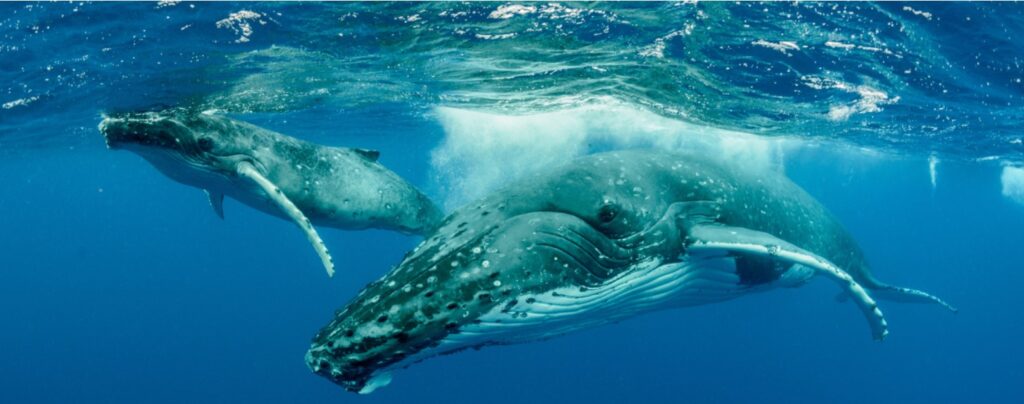A young activist has been suspended in a tree-sit 25m above the ground blocking the access road for logging trucks in resistance to native forest logging in Ourimbah State Forest and the EDO is attempting to stop logging in the state’s north-east.
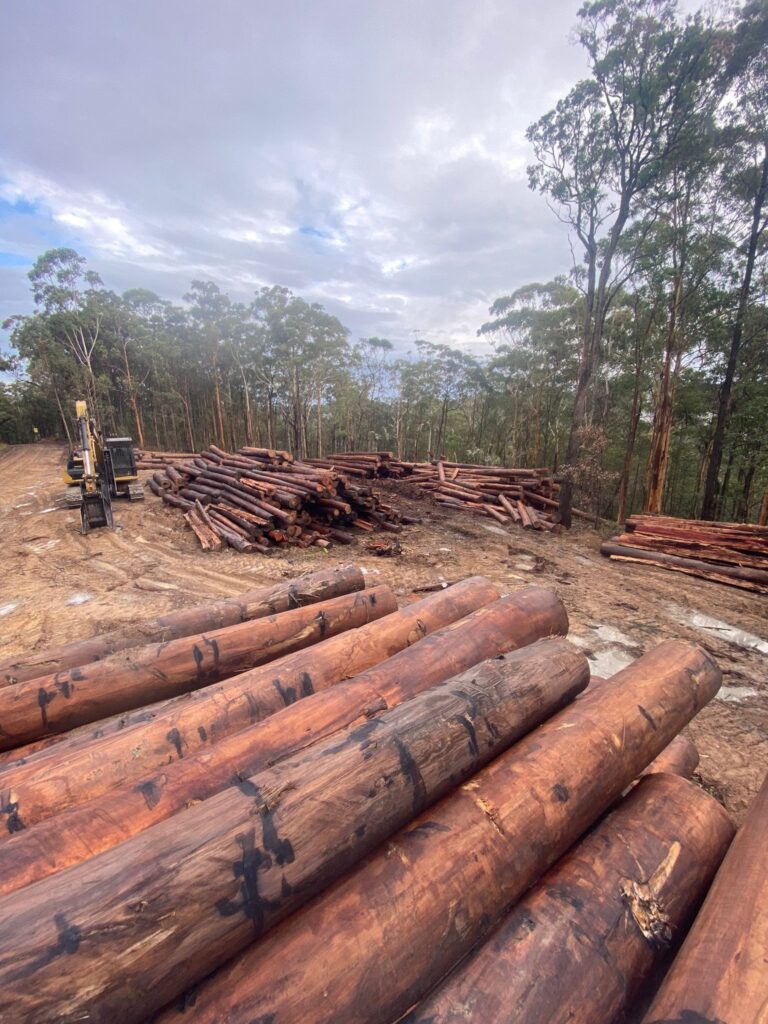
By Jacquelene Pearson
The tree-sit action is one of several initiatives currently under way to protect native forests, habitat, and Indigenous cultural heritage as the Forestry Corporation of NSW ramps up its controversial and loss-making practice of native forest logging. Other initiatives include Tea for Trees every Tuesday until the Ourimbah logging stops and on Friday, August 4 an online advocacy event called Hour of Power is focusing on the logging of Ourimbah State Forest.
Meanwhile, Last Thursday the Environmental Defenders Office legal team, on behalf of the North East Forest Alliance (NEFA), applied for an urgent injunction to stop logging in Myrtle and Braemar state forests. If granted, this will be the first time a community group has obtained a logging injunction in NSW in more than 20 years. Forestry Corp has agreed to pause logging until Wednesday, August 2, when the injunction application will be heard in court.
So it’s an important time for campaigning to save NSW state forests. Here’s what you need to know.
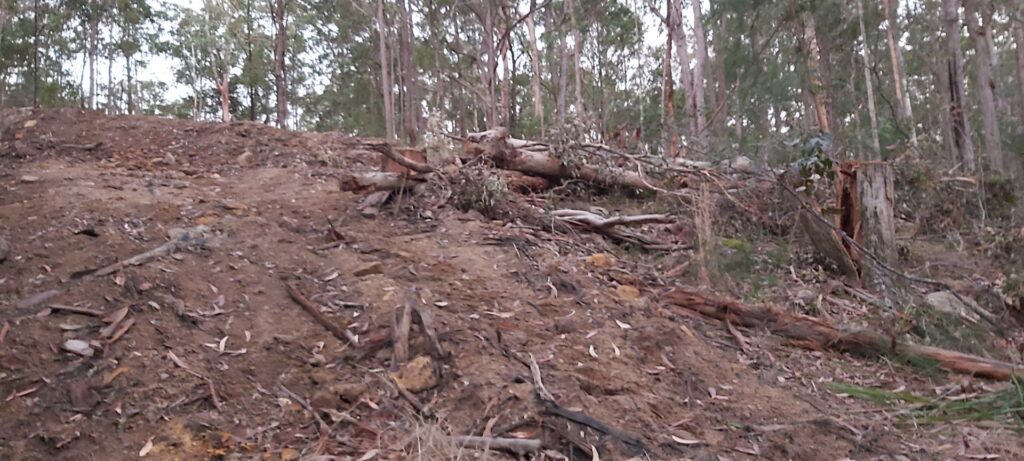
Ourimbah
The native forest logging in Ourimbah State Forest began again on the 11th of July, in spite of a two-year active campaign running to protect OSF, and local community push back for over 30 years.
Ourimbah State Forest is one of the closest state forests to Sydney and it is a widely used recreation area.
“Ourimbah State Forest is one of the last buffers for residents of the Central Coast. With the approach of El Nino, heatwaves and bushfires are already circulating the planet. We have been compelled to act, because the NSW Labor government isn’t” said Georgie Toner on behalf of Forest Defence NSW.
The fact that logging increases fire risk has become a prominent topic. Research by the Australian National University (ANU) and others shows that logging drys forests, making them much more fire prone.
“As members of the community we are concerned about fire risk on the Central Coast, and are heartbroken by the Forestry Corporations lack of response regarding koalas and other native habitat. We have seen the logging debris the Forestry Corporation of NSW has left behind, which compiled with the research by the ANU, creates catastrophic fire risk” said local Catrina Sturmberg.
An article published by The Guardian outlined that the Perrottet government found native logging could be ended in NSW without costing the budget. A member of the former government has said that the ‘plan is ready to be activated if Labor wants to do it’.
“We are calling on the NSW Labor Government to follow in the footsteps of Western Australia and Victoria, and end native forest logging now, before it’s too late” said Georgie Toner.
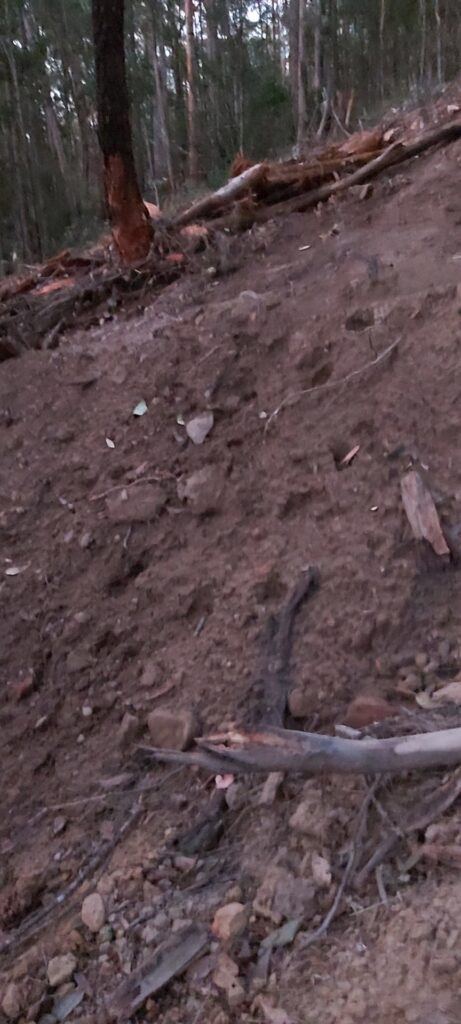
Myrtle and Braemar
According to the EDO, the Myrtle and Braemar State Forests were severely damaged by the ferocious 2019-20 bushfires, which wiped out an estimated 70 per cent of the local koala population.
NEFA’s own surveys indicate that koalas are still present in these forests – making their protection vitally important. Before the fires, we know the forests were home to 23 other threatened plants and animals including the southern greater glider, yellow-bellied glider, rufous bettong, masked owl, and Slaty Red Gum.
Experts report that logging forests after bushfires increases the risk of future bushfires and can render the forest uninhabitable for wildlife for decades, or even centuries.
With the koala on a sharp trajectory to extinction in NSW and Australia’s native species facing a growing threat from climate change, our client says logging the fire-affected Myrtle and Braemar state forests should be unthinkable.
Yet that’s exactly what the NSW Forestry Corporation says it is approved to do.
“That’s why we’ve asked the Land and Environment Court for an urgent interlocutory injunction on behalf our client NEFA,” the EDO said.
“If granted, the court will order Forestry Corp to immediately stop logging the two state forests until the court makes a final decision about whether the logging approvals are lawful.
“Our lawyers will argue on behalf of NEFA that logging these areas is not ecologically sustainable and the use of ‘voluntary conditions’ is in breach of the logging rules.
“Our client will ultimately ask the court to declare the logging approvals invalid.”
Tea for trees
The first Tea for Trees was held on Tuesday, August 1 and will continue weekly until the logging of Ourimbah State Forest is stopped.
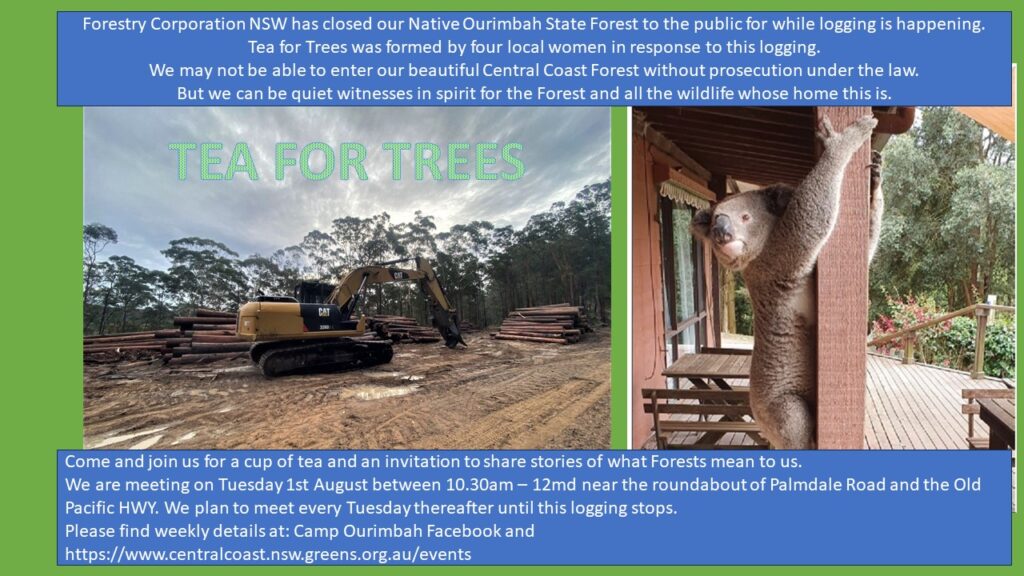
“Tea for Trees was born from a feeling that we needed to find creative ways to alert the people of the Central Coast that our local Native Ourimbah State Forest was being destroyed by logging,” said organiser and local resident Debbie Chu.
“We (myself, and three close friends), wanted to support our Native Ourimbah State Forest from a place of deep heart, to offer an honouring of the forest and all who call it home.
“We want to draw attention to its plight and invite anyone to come and share this calm holding space. Anger, as a spur to action against injustice is really important, it carries energy and captures attention.
“However, we feel that acting from other places of energy are also important and powerful. Many people have great concern for our forests and wildscapes and perhaps need different ways to express their concern and act for change.
“In Tea for Trees we can sit, chat, sign letters, create more ideas for action on native forests, share a cuppa and stories, or just be in the quiet.
“We hope this is an inclusive time. Other people may want to create their own Tea for Trees. All that is needed is a treeful heart, a chair and a cup of tea.
“Forestry Corp NSW (FCNSW) re-started logging in the Native Ourimbah State Forest, without notice, earlier this month. It was discovered accidentally by a walker in the forest.
“There was no opportunity to check for vulnerable wildlife. The initial logging was on a steep slope above Canada Drop Down Creek. This creek is designated Key Fish Habitat and is a complex fourth order waterway supporting platypus and a myriad of life.
“The run-off that will occur in wet weather will pour silt and dirt into the creek. Canada Drop Down Creek will flow with this polluting burden into Ourimbah Creek and eventually into Tuggerah Lakes.
“The logging in the forest is now, we believe, speeding toward the identified area of the endangered Stuttering Frog and approaching the breeding roost of the micro Horseshoe Bat.
“Although FCNSW is obliged to respect setbacks from waterways and endangered wildlife, including plants and trees, there are no public means to ensure this observance as we, the public, are locked out of our forest until the logging is complete and the trees and habitat gone.
“In the past FCNSW has been fined over $680,000 for breaches. Effects of logging such as disturbing noise, vibration, dehumidification and loss of shade and shelter are not mitigated by setbacks. Wild native forest beings do not follow Forestry’s tidy maps.
“The logging of native forests is just so sad and unnecessary. It contributes to fire hazard and climate change. It is possible for our governments and industry to act positively now, for our future. For example, degenerated land can be turned into timber plantations to meet construction industry needs. There are alternative products such as waste soft plastics that can be turned into ‘timber’ for decking and the like. Every Native Forest is deserving of a chance to survive. How do we change the hearts and minds of those who have the power to stop this logging?
Hour of power
On Friday, August 4 a monthly Hour of Power online event will focus on taking action to stop the logging of native forests:
“The Ourimbah State Forest, beautiful forest on the Central Coast NSW, is being logged and koala habitat destroyed. In this first online Hour of Power we’ll learn more about the threat to this koala habitat and forest ecosystem and we’ll take action to get our voices heard by the State government to urgently halt logging.
“Our guest speaker will be Ursula Da Silva, forest campaigner with Camp Ourimbah. This event will give you the info you need from our local expert and then we’ll get active together in real time emailing the relevant Members of Parliament and then inviting our own networks online to get involved in taking action too.
“To get the Zoom link for the event you MUST register here:
https://events.humanitix.com/hour-of-power-to-save…
Help promote the event by sharing this Facebook Event (but please let people know that they need to register on the above link to get the Zoom link).


